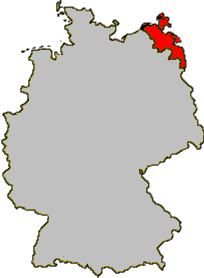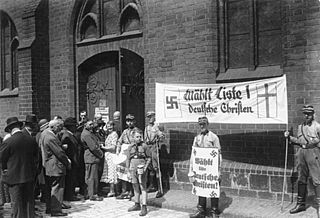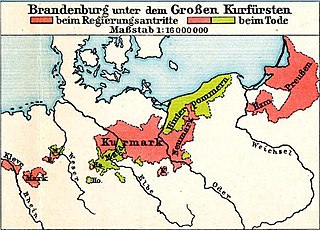
The Protestant Church in Germany, formerly known in English as the Evangelical Church in Germany, is a federation of twenty Lutheran, Reformed, and United Protestant regional Churches in Germany, collectively encompassing the vast majority of the country's Protestants. In 2020, the EKD had a membership of 20,236,000 members, or 24.3% of the German population. It constitutes one of the largest Protestant bodies in the world. Church offices managing the federation are located in Herrenhausen, Hanover, Lower Saxony. Many of its members consider themselves Lutherans.

The Pomeranian Evangelical Church was a Protestant regional church in the German state of Mecklenburg-Vorpommern, serving the citizens living in Hither Pomerania. The Pomeranian Evangelical Church was based on the teachings brought forward by Martin Luther and other Reformators during the Reformation. It combined Lutheran and Reformed traditions. The seat of the church was Greifswald, the bishop's preaching venue was the former Collegiate Church of St. Nicholas in Greifswald.

The German Evangelical Church was a successor to the German Protestant Church Confederation from 1933 until 1945.

The Prussian Union of Churches was a major Protestant church body which emerged in 1817 from a series of decrees by Frederick William III of Prussia that united both Lutheran and Reformed denominations in Prussia. Although not the first of its kind, the Prussian Union was the first to occur in a major German state.

Ss. Peter and Paul Church on Nikolskoë is a Protestant church in the Volkspark Glienecke in Berlin, Germany. It is currently administered by the Evangelical Church of Berlin-Brandenburg-Silesian Upper Lusatia. The church is part of the UNESCO World Heritage Site Palaces and Parks of Potsdam and Berlin.

The Protestant Church in the Rhineland is a United Protestant church body in parts of the German states of North Rhine-Westphalia, Rhineland-Palatinate, Saarland and Hesse (Wetzlar). This is actually the area covered by the former Prussian Rhine Province until 1920.

Evangelical Church of the Palatinate is a United Protestant church in parts of the German states of Rhineland-Palatinate and Saarland, endorsing both Lutheran and Calvinist orientations.
The Evangelical Church of the Church Province of Saxony was the most important Protestant denomination in the German state of Saxony-Anhalt. As a united Protestant church, it combined both Lutheran and Reformed traditions. On 1 January 2009 the church body merged with the Evangelical Lutheran Church in Thuringia into the Evangelical Church in Central Germany.

Friedrich Karl Otto Dibelius was a German bishop of the Evangelical Church in Berlin-Brandenburg, a self-described anti-Semite and up to 1934 a conservative, who became a staunch opponent of Nazism and communism.
Lutheran viewpoints concerning homosexuality are diverse because there is no one worldwide body which represents all Lutherans. The Lutheran World Federation, a worldwide 'communion of churches' and the largest global body of Lutherans, contains member churches on both sides of the issue. However, other Lutherans, including the Confessional Evangelical Lutheran Conference and International Lutheran Council, completely reject homosexuality.

The Diocese of Görlitz is a Latin Church diocese of the Catholic church in Germany. The current ordinary is Wolfgang Ipolt
In Germany and Switzerland, a Landeskirche is the church of a region. The term usually refers to Protestant churches, but—in case of Switzerland—also Roman Catholic dioceses. They originated as the national churches of the independent states, States of Germany (Länder) or Cantons of Switzerland , that later unified to form modern Germany or modern Switzerland, respectively.

The Union of Protestant Churches in the Protestant Church in Germany is an organisation of 10 United and 2 Reformed Protestant churches in Germany, which are all member churches of the Protestant Church in Germany.

The German term Kurmark referred to the Imperial State held by the margraves of Brandenburg, who had been awarded the electoral (Kur) dignity by the Golden Bull of 1356. In early modern times, Kurmark proper denoted the western part of the margraviate to the exclusion of later acquisitions.

Jesus Church (Kaulsdorf) (German: Jesuskirche, colloquially also Dorfkirche, village church) is the church of the Evangelical Berlin-Kaulsdorf Congregation, a member of today's Protestant umbrella organisation Evangelical Church of Berlin-Brandenburg-Silesian Upper Lusatia (under this name since 2004). The church building is located in Berlin, borough Marzahn-Hellersdorf, in the locality of Kaulsdorf. The church was named after Jesus of Nazareth. The congregation's parish comprises the area of the historical village of Kaulsdorf, which had been incorporated into Berlin by the Prussian Greater Berlin Act in 1920.

Markus Dröge is a German theologian and was from 2009 until 2019 bishop of the Evangelical Church Berlin-Brandenburg-Silesian Upper Lusatia (EKBO).

The Protestant Church of Anhalt is a United Protestant member church of the Protestant Church in Germany. Its seat is in Dessau-Roßlau in Saxony-Anhalt, in the former duchy of Anhalt. This church is the smallest regional church in Germany in terms of membership.
The German Protestant Church Confederation was a formal federation of 28 regional Protestant churches (Landeskirchen) of Lutheran, Reformed or United Protestant administration or confession. It existed during the Weimar Republic from 1922 until replaced by the German Evangelical Church in 1933. It was a predecessor body to the Protestant Church in Germany.

In Protestant usage, a consistory designates certain ruling bodies in various churches. The meaning and the scope of functions varies strongly, also along the separating lines of the Protestant denominations and church bodies.
Andreas Sieling is a German organist and musicologist.














